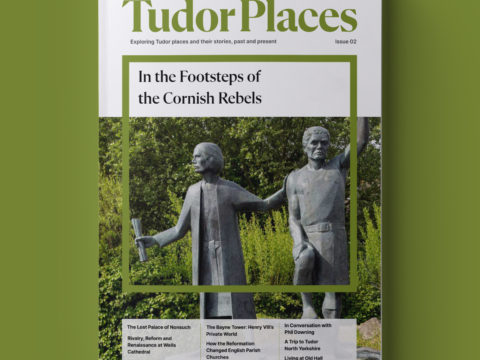Francis Walsingham: Life Story
Chapter 2 : Exile
In 1553, the political landscape changed dramatically when Edward VI died, aged only fifteen. His attempt to pass the crown to his cousin, Lady Jane Grey, who was as zealously Protestant as he was, failed, and, by August 1553, Mary, elder daughter of Henry VIII, and Catholic, was firmly ensconced on the throne – carried there by a wave of popular support.
Nothing is known of Francis’ views on the succession crisis of 1553, or the Protestant-inspired rebellion of Sir Thomas Wyatt the following spring, although his Walsingham cousins may have been implicated in the latter.
The majority of the leading Protestants of Edward’s reign confirmed to the restored Catholic laws. Whilst Protestant preachers inveighed against Nicodemites, as they called those who remained Protestant at heart, but conformed outwardly to the law, only the most committed put their faith first and left England for the sunny uplands of Calvinist Geneva or the reformed cities of Germany.
In the autumn of 1555, as Mary’s government moved from exhortation to return to the old ways, to a more sustained programme of physical coercion, Francis became one of those who could not conform and went into exile (although it is possible he left earlier, perhaps in spring of 1554). Together with three of his Denny cousins, Henry, Anthony and Charles, he travelled to Basel, where all four became students at the city’s university. Francis spent most of the next three years in Basel, although he also spent time in Padua, where he was spokesman for the English students at Padua’s university – and where he also bought a large quantity of wine, and a clavichord.
Amongst the Protestant exiles in Basel, with whom Francis became acquainted, were John Foxe, whose Book of Martyrs had a profound effect on English Protestantism, and John Knox, in exile from Scotland. Amongst the radical ideas that permeated the exiles was the concept that, perhaps, monarchs who were tyrants (generally to be equated with monarchs who did not agree with the preacher) could be overthrown.
Female monarchs, in particular, were suspect and Knox fulminated against Mary of England, and the regent of Scotland, Marie of Guise, in his First Blast of the Trumpet against the Monstrous Regiment of Women. Whilst Francis may not have gone so far in his views as Knox, he certainly did not later treat his mistress, Elizabeth I, with the level of deference that many of his colleagues did.
Mary I died in November 1558, to be succeeded by her half-sister, Elizabeth. Elizabeth, although by no means so radical as Edward VI had been, was widely assumed to be a Protestant. One of her first acts was to appoint Sir William Cecil as her principal secretary. Francis probably already knew Cecil – they certainly had moved in the same circles during Edward’s reign, although Cecil had chosen to conform under Mary, and had even been on good terms with Cardinal Pole, the last Catholic Archbishop of Canterbury.
Elizabeth’s strongest supporters were Protestants, obliging the new queen to adopt a rather more Protestant religious settlement than she had initially sought – especially as Mary’s bishops had resigned en-masse, necessitating Elizabeth appointing new bishops from amongst the exiles who now poured back over the Channel. The 1552 Book of Common Prayer was implemented (with minor modifications) but ministers were required to wear vestments, and the queen continued the practice of candles on the altar, and choral singing.
Francis, too, returned from Basel and by 1559 he had found a place in Elizabeth’s first Parliament, sitting for the Cornish seat of Bosinney. With no local connections, his selection was probably arranged by a fellow-exile, the Earl of Bedford. There is no evidence of Francis speaking in Parliament, but he was obviously of sufficient value to the government for Cecil to want him returned again in 1563, this time for Lyme Regis, another seat within Bedford’s gift.
In 1562, Francis married. His wife was Anne Barnes, daughter of Sir George Barnes, who, as Lord Mayor of London, had proclaimed Lady Jane Grey as queen. She was a widow with a son and daughter, Christopher and Alice Carleill. The Carleill and Barnes families had been founder members of the Muscovy company, of which Francis later became a director.
In the previous decade, Francis’ five elder sisters had married into families of city merchants, government office-holders and minor gentry, giving him a web of connections in London, at court and in Parliament. All the sisters married men considered godly, giving Francis strong links with the Puritan movement which gathered strength over Elizabeth’s reign.
Francis and Anne sold his patrimony of Foot’s Cray, and purchased a new estate in Hertfordshire, named Parkbury where they probably lived the life typical of the local gentry – he as a Justice of the Peace, and she visiting friends, taking care of the poor of the neighbourhood and bringing up her children. The marriage lasted only two years, as Anne died in 1564. The contents of her will (which, as a married woman, she would have required Francis’ permission to make) suggest a level of affluence, either from her first marriage or provided by Francis. She left her husband £100 and the guardianship of her son.



